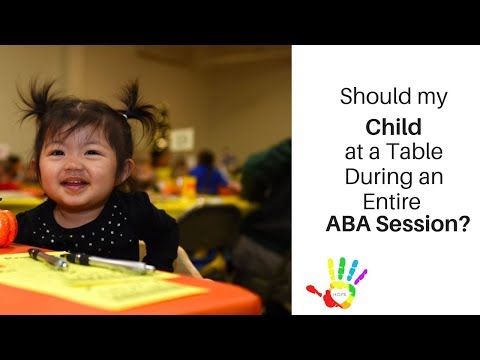One of the main concerns that parents have when starting ABA is that their child will be sitting at the table doing repetitive trials an entire session. My friends, if that is what your ABA therapist says, run for the hills! In this video I explain why that’s just not true!
A new video will be posted to this series weekly. Subscribe so you do not miss a video and send video requests or questions to Jessica@JessicaLeichtweisz.com
Credits:
Photo: Morguefile
Sound effect: Incomputek
Intro: Graeme Kan
Video Production: Nathan Bedford
Disclaimer:
This video is intended for information purposes only. It is not intended to diagnose or treat any medical condition. The text, graphics, images, flash movies, and audio segments are not intended to be a substitute for professional medical advice, diagnosis, or treatment. Always seek the advice of your physician or other qualified health provider with any questions you may have regarding a medical condition.
The information contained in this segment is generalized. It may not be applicable in every situation. Before applying specific interventions, consult a behaviorist. Any behavior intervention can result in an undesired change in behavior if not implemented correctly. No client relationship is established as a result of watching these videos. Jessica Leichtweisz and Hope Education cannot be held responsible for any misuse of the information contained in these videos. <br> <h3>Auto Generated Captions</h3>
[Music]
hi and welcome back to hope education
video series on autism and ABA my name
is Jessica likewise CEO of hope
education services and I’m really
passionate about helping you get your
children the best ABA treatment possible
every week I post a video answering your
questions about ABA
tonight we’re going to talk a little bit
about whether or not
ABA should be only at the table where
ABA is taught in different places so one
of the questions families ask all the
time is my tiles going to be sitting at
the table for two three hours and never
getting up the answer is no typically
when you’re using a table and
instruction it’s because you’re using
something called discrete trial training
which is a part of ABA but not the
entire part of ABA
any good ABA therapist will include lots
of different activities that don’t
always take place at the table they’ll
be working on self-help skills like
tooth brushing or head washing making
your bed using a budget shopping in a
store depends upon your learner their
skill level and their age but they won’t
always be at the table even if your
child is receiving a program that relies
heavily upon using discrete trial
training they’ll still get plenty of
breaks away from the table and your ABA
therapist will be playing with them on
those breaks doing anything like
building blocks or playing with trains
lots of things during a ball back and
forth going on a swing that take place
without sitting down so I hope that
answers your question if you have any
other questions please feel free to
email me my email Jessica Jessica
likewise comm also if you have want to
check out our other videos where lots of
other questions have been answered
just check out our YouTube page or our
Facebook page at Hope education services
god bless and have a great night and
don’t forget to send in your questions
[Music]
you
Should my Child be Sitting at a Table During an Entire ABA Session ELyuSMn4ZwM
[Music]
hi and welcome back to hope education
video series on autism and ABA my name
is Jessica likewise CEO of hope
education services and I’m really
passionate about helping you get your
children the best ABA treatment possible
every week I post a video answering your
questions about ABA
tonight we’re going to talk a little bit
about whether or not
ABA should be only at the table where
ABA is taught in different places so one
of the questions families ask all the
time is my tiles going to be sitting at
the table for two three hours and never
getting up the answer is no typically
when you’re using a table and
instruction it’s because you’re using
something called discrete trial training
which is a part of ABA but not the
entire part of ABA
any good ABA therapist will include lots
of different activities that don’t
always take place at the table they’ll
be working on self-help skills like
tooth brushing or head washing making
your bed using a budget shopping in a
store depends upon your learner their
skill level and their age but they won’t
always be at the table even if your
child is receiving a program that relies
heavily upon using discrete trial
training they’ll still get plenty of
breaks away from the table and your ABA
therapist will be playing with them on
those breaks doing anything like
building blocks or playing with trains
lots of things during a ball back and
forth going on a swing that take place
without sitting down so I hope that
answers your question if you have any
other questions please feel free to
email me my email Jessica Jessica
likewise comm also if you have want to
check out our other videos where lots of
other questions have been answered
just check out our YouTube page or our
Facebook page at Hope education services
god bless and have a great night and
don’t forget to send in your questions
[Music]
you
https://i.ytimg.com/vi/ELyuSMn4ZwM/hqdefault.jpg ABA,Autism,Applied behavior analysis,net training,natural enviornment training,discrete trial training,special education,applied behaviour analysis,hope education services,jessica leichtweisz One of the main concerns that parents have when starting ABA is that their child will be sitting at the table doing repetitive trials an entire session. My friends, if that is what your ABA therapist says, run for the hills! In this video I explain why that’s just not true!
A new video will be posted to this series weekly. Subscribe so you do not miss a video and send video requests or questions to Jessica@JessicaLeichtweisz.com
Credits:
Photo: Morguefile
Sound effect: Incomputek
Intro: Graeme Kan
Video Production: Nathan Bedford
Disclaimer:
This video is intended for information purposes only. It is not intended to diagnose or treat any medical condition. The text, graphics, images, flash movies, and audio segments are not intended to be a substitute for professional medical advice, diagnosis, or treatment. Always seek the advice of your physician or other qualified health provider with any questions you may have regarding a medical condition.
The information contained in this segment is generalized. It may not be applicable in every situation. Before applying specific interventions, consult a behaviorist. Any behavior intervention can result in an undesired change in behavior if not implemented correctly. No client relationship is established as a result of watching these videos. Jessica Leichtweisz and Hope Education cannot be held responsible for any misuse of the information contained in these videos.



